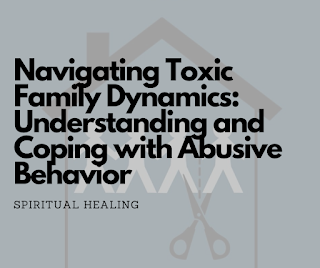Family is supposed to be a source of love, support, and comfort, but for many individuals, the reality is much different. Toxic family dynamics can have a devastating impact on our mental health and well-being. Understanding and coping with abusive behavior from family members is crucial for maintaining our own emotional stability and finding healthy ways to navigate these difficult relationships.
Toxic family dynamics can take many forms, including verbal abuse, emotional manipulation, and even physical abuse. One of the most common signs of a toxic family member is a chronic lack of empathy. They may make cruelly critical remarks about your appearance, relationship status, mental or physical health, financial struggles, or career challenges. Even if they insist they're just teasing, these comments can be deeply wounding.
Another common tactic used by toxic family members is the silent treatment. They may refuse to speak to you for hours or even days following an argument, using silence as a form of punishment and emotional control. This can be particularly damaging because it leaves you feeling unsupported and isolated.
Toxic family members may also lie or deny reality, creating confusion and distrust. They may even cover a lie with another lie, and deny that anything is wrong. This can make it difficult for you to believe anything they say, and can leave you feeling constantly on edge.
Toxic family members may also use generalizations during disagreements, making vague accusations that are hard to dispute. They may say things like "it never works out" or "you always do this" that can leave you feeling powerless and frustrated.
Another sign of a toxic family member is sowing conflict with other family members. They may pit siblings against each other, or share private information about one family member with others. This can create a hostile and competitive environment that can be damaging to everyone involved.
If you find yourself dealing with toxic family dynamics, it is important to understand that you are not alone. Many individuals struggle with unhealthy patterns of behavior from family members, and it is not a reflection of your own worth or value. It's important to remember that toxic behavior is often perpetuated by a toxic environment, and the toxic individuals may not be aware of their own harmful patterns.
It can be difficult, but it's crucial to set boundaries with toxic family members, and to seek professional help if the situation becomes too overwhelming. Consider therapy or counseling to learn healthy ways to cope with the abuse, and to gain support and guidance.
Ultimately, it is important to prioritize your own mental health and well-being, and to find ways to create a positive and supportive environment, even if that means limiting or ending contact with toxic family members. You deserve to be surrounded by love, support, and understanding, and it's okay to take whatever steps are necessary to make that a reality.







0 Comments